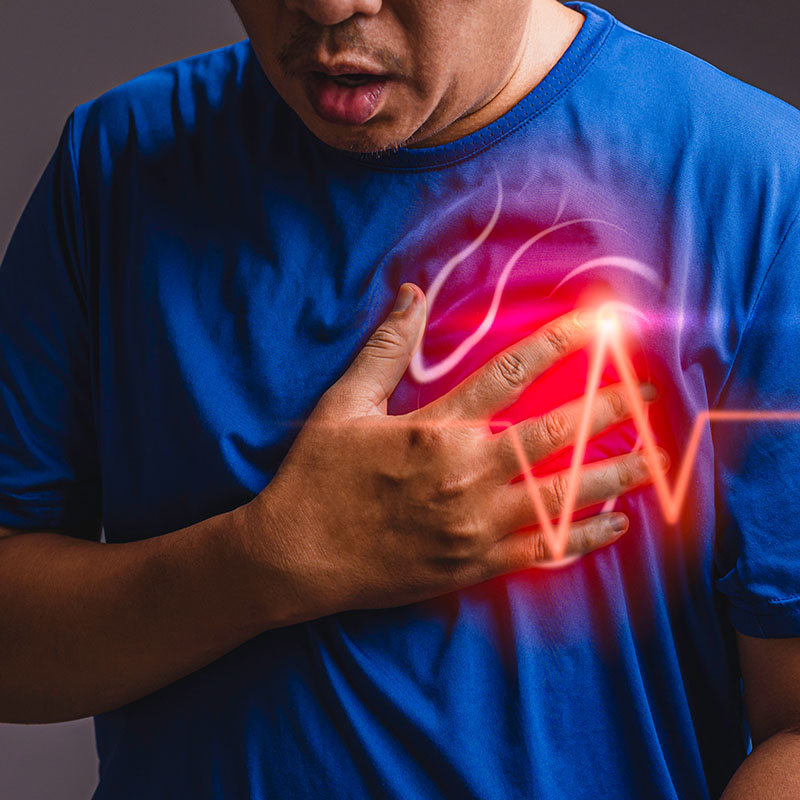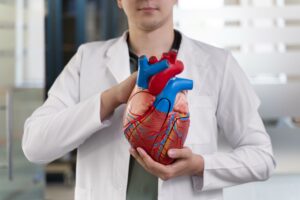Cardiovascular Diseases
What is Cardiovascular Disease
Our cardiovascular system comprises of the blood vessels; the blood that flows through these blood vessels carrying oxygen, nutrients, hormones, and cellular waste products; and the heart, which untiringly pumps this blood to the blood vessels all across our body. Our heart is an incredibly hard working organ that beats about 100,000 times in one day, transporting, on an average, 5 litres of blood throughout the body, every single minute of our lives. Cardiovascular Diseases are a host of ailments impeding and in some cases stopping this absolutely necessary operation to sustain life.
Cardiovascular Diseases (CVDs), as estimated by the World Health Organisation (WHO), is the single largest cause of death globally, and accounts for 17.9 million lives each year, representing a whopping 31% of all global deaths! CVDs were initially thought of disproportionately affecting men, and that women are comparatively more immune to them. However, that myth has been completely debunked by modern research. While men are affected earlier than women, Harvard Health Publishing reports that CVDs kill almost one-third of all persons, irrespective of their gender. While CVDs are incredibly effective killers, their effect on our bodies can be significantly altered with lifestyle changes, which means, we can choose to play a part in how we deal with these sets of cardiovascular diseases.
There are different types of cardiovascular diseases that affect us, some of which are lifestyle related, while others are genetically determined.
Before understanding the role of the role of a cardiac nutritionist in curbing CVDs, let’s look at the some of the different kinds of cardiovascular ailments:
- Arrhythmia– Arrhythmia is a condition where the rhythm of our heart becomes abnormal. It either beats too fast, or too slow.
- Atherosclerosis– Atherosclerosis is an extremely prevalent form of Cardiovascular Diseases that encompasses the building up of fats, cholesterol, and other substance along the arterial walls, which can severely restrict blood flow.
- Cardiomyopathy– Cardiomyopathy is the disease of the heart muscle, in which it becomes harder for the heart to pump blood to the rest of our body.
- Congenital Heart Defects– Congenital Heart Defects are heart abnormalities that are present at birth.
- Rheumatic Heart Disease– Damage to the heart muscle and heart valves from rheumatic fever, caused by streptococcal bacteria.
Need to consult?
Quickly Book an Appointment.

Symptoms of Cardiovascular Diseases
The prevalence of Cardiovascular Diseases like atherosclerosis, Arrhythmia and Cardiomyopathy can be significantly altered through lifestyle changes. Before delving deep into how lifestyle changes can alter the onset of CVDs, let’s look at their symptoms:
Symptoms of Atherosclerosis
The symptoms for atherosclerosis might be different for men and women. Men, for example, are more prone to having chest pain, while women can have some chest discomfort, in addition to shortness of breath, nausea and extreme fatigue. In addition, there might be coldness and numbness in limbs as well as some unusual or unexplained pain all across the body.
Symptoms of Arrhythmia
Arrhythmia can lead to heartbeats becoming either too fast or too slow. Some may have fluttering heart or racing heartbeat, whereas others may have slow pulse rate. People with Arrhythmia can suffer from light-headedness, dizziness, fainting spells, as well as chest pain.
Symptoms of Cardiomyopathy
In Cardiomyopathy the muscles of heart grow larger and turn rigid, thick or weak that may cause fatigue, bloating, swollen legs, shortness of breath and pounding or rapid pulse.
Risk Factors associated with Cardiovascular Diseases
We need to be extremely vigilant in recognising early onset of the symptoms described above. There are several risk factors that contribute to people developing these CVDs, and if we are more exposed to these risk factors- genetic, behavioural or pre-existing conditions that exacerbate the risk of CVDs – we need to be even more at alert.
While sex, age, family history, body build up, as well as complications during birth may result in an increased risk of developing cardiovascular diseases, most of these factors are beyond our control. We cannot do much about them. However, several of the risk factors that lead to Cardiovascular Diseases can be significantly brought down by implementing certain lifestyle changes.
These kinds of risk factors include:
- Excessive stress
- Smoking
- Sedentary lifestyle
- Obesity
- Food habits (Diet with excessive fat and sugar, and lack of antioxidants)
- Water Consumption
- Alcohol Consumption
In addition, certain pre-existing conditions, like hypertension and diabetes, may severely increase the likelihood of getting these cardiovascular diseases. However, both these conditions and lifestyle risk factors described above can be worked at and controlled.
Complications from Cardiovascular Diseases
Cardiovascular Diseases may lead to severe complications, and in many cases to death. Let’s briefly look at the kind of complications we may expect from cardiovascular diseases:
Heart Attack: Heart attack usually occurs with the formation of blood clot that may block the flow of blood through the vessel, which, in turn, may damage or destroy part of our heart muscles. Atherosclerosis is often responsible for heart attack.
Heart Failure: Heart failure occurs when heart fails to pump enough blood all across the body. It may result in kidney failure, liver damage, arrhythmia and heart valve problems.
Stroke: Stroke happens when arteries to the brain is narrowed or blocked so that too little blood reaches the brain. In a stroke, the brain tissues may begin to die within a few minutes of the stroke.
Sudden Cardiac Arrest: Arrhythmia often causes this sudden loss of heart function, accompanied by loss of breathing and consciousness. The result might be fatal, if not treated immediately.
Aneurysm: Aneurysm is a bulge that may develop in the arterial wall. In case an aneurysm bursts, significant internal bleeding might occur.
Peripheral Artery Disease: Atherosclerosis often leads to Peripheral Artery Disease, which further results in our peripherals, mostly our limbs, not receiving enough blood flow. It may cause leg pain while walking.
Coronary Artery Disease: Atherosclerosis also results in Coronary Artery Disease, where plaque is deposited on the walls of the arteries slowing down the blood flow.
It is clearly evident from the complications listed above that Cardiovascular Diseases can be enormously life-threatening and it isn’t without reason that these diseases kill almost one-third of every living person inhabiting this earth.
How to diagnose cardiovascular diseases?
-
- After a detailed physical examination and studying the symptoms, different types of tests are prescribed to patients. Some of the most common tests are as follows:
- Blood tests: For measuring Triglycerides and cholesterol levels like LDL, VLDL and HDL.
- ECG (Electrocardiogram): Helps to monitor heart’s electrical activity.
- Echocardiogram: Heart’s structure is identified with Echocardiogram.
- Holter monitor: Helps in identifying the heart rate of an individual
- Stress test: Helps in recognizing the changes of heart activity during exertion.
- CT Scan: Provides X-ray image of the heart
- Heart MRI: provides detailed picture of heart along with arteries.
- Cardiac marker test: Provides level of cardio biomarker, which further indicates cardiac complications in the long run.
Treatment and Management of Heart Diseases:
- Early detection helps to reduce complications. The three ways to treat and manage cardiovascular diseases are as follows:
- Lifestyle modifications: This is an important part of treating people with cardiovascular diseases. By modifying diet, stopping smoking and following a proper lifestyle management may help in reducing cardiovascular problems.
- Medications: Medications are provided by doctors as a way of treating cardiovascular disease.
- Surgery: Different types of surgeries are done as per requirement like Coronary Angioplasty, Atherectomy and Coronary Artery Bypass Surgery.
What is exciting though, we can do a great deal in averting these terrible and fatal conditions! So, get in touch with a cardiologist nutritionist for management of heart disease and embrace a healthy life!
- WHO, https://www.who.int/en/news-room/fact-sheets/detail/cardiovascular-diseases-(cvds)
- Biedermann, Barbara. (2008). Clinical signs of atherosclerosis. 10.13140/RG.2.1.1912.7449.
- Humphreys, Melanie & Warlow, Celia & McGowan, John. (2013). Arrhythmias and their Management. 10.1002/9781118785331.ch10.
- Patel, Peysh & Ali, Noman. (2018). An overview of dilated cardiomyopathy. Annals of Cardiovascular Diseases. 3. 1022.
- Srilakshmi , DIETETICS, third edition, new age international (P) limited, publishers, chapter 14, page no 152-156.
- American heart association, https://www.heart.org/en/health-topics/consumer-healthcare/what-is-cardiovascular-disease
- https://www.ucsfhealth.org/education/diagnosing-heart-disease
- https://www.hopkinsmedicine.org/health/conditions-and-diseases/coronary-artery-disease-prevention-treatment-and-research
- https://www.healthline.com/health/heart-disease#treatment
Food & Wellness
Cardiovascular Disease Management Program
Cardiovascular Diseases can be controlled through diet and lifestyle modifications.
At Food n Wellness, our cardiac nutritionist will prepare the diet plan that will be meticulously designed towards making improvements in your conditions over and beyond our period of our engagement. We shall discuss with you your food preferences, dietary habits, lifestyle, exercise pattern, sleep cycle, and review your medical reports, travel frequencies, cooking restrictions, food allergies and other details. On the basis of the information collected we shall craft detailed plan for you.
Our Cardiovascular Disease Management Programme aims to enhance your cardiovascular health by reducing lipid profile levels like cholesterol and triglycerides, controlling high blood pressure, and implementing necessary weight management modifications as per individual requirement. We would also thoroughly analyse the nutritional requirements of the patient and prescribe individualised tips and supplements.
The diet recommendations shall be flexible and provide you with ample varieties, so that the food you eat won’t be monotonous and you shall be able to follow and embrace it. In addition to the diet plan, a detailed exercise schedule shall also be provided prepared by professionals to avert cardiovascular diseases.
Once the programme ends, a maintenance plan is suggested so that you shall be able to implement the learning during the period of programme to plan for a healthy future.

Let's get started with treating your condition...
At Food & Wellness we believe that every individual is different and needs special attention. We adapt our programme to your existing lifestyle and try not to change anything drastically so you can easily transition. Over a period of time we ensure results and help you restore your health.
Heart Articles

Can Cardiovascular Disease be Cured?
Cardiovascular disease (CVD) remains one of the leading causes of mortality worldwide. It encompasses a range of conditions affecting the heart and blood vessels, including coronary artery disease, heart failure, stroke, and peripheral arterial disease. Despite significant advancements in medical science, the question remains: can cardiovascular disease be cured? In this blog, we will delve

Why Choose a Cardiac Nutritionist?
In a world where health consciousness is on the rise, individuals are becoming increasingly aware of the importance of cardiovascular well-being. Amidst the myriad of health professionals, the role of a cardiac nutritionist stands out as a crucial element in fostering heart health. This article delves into the reasons why choosing a cardiovascular dietitian can

How to Build a Strong Heart Health?
Heart health is something we all care about, but it’s easy to feel overwhelmed by the sheer amount of information out there. We often worry about our risk of heart disease, which is the leading cause of death worldwide. Even the statistics says so. According to the World Health Organization (WHO), cardiovascular diseases (CVDs) are


